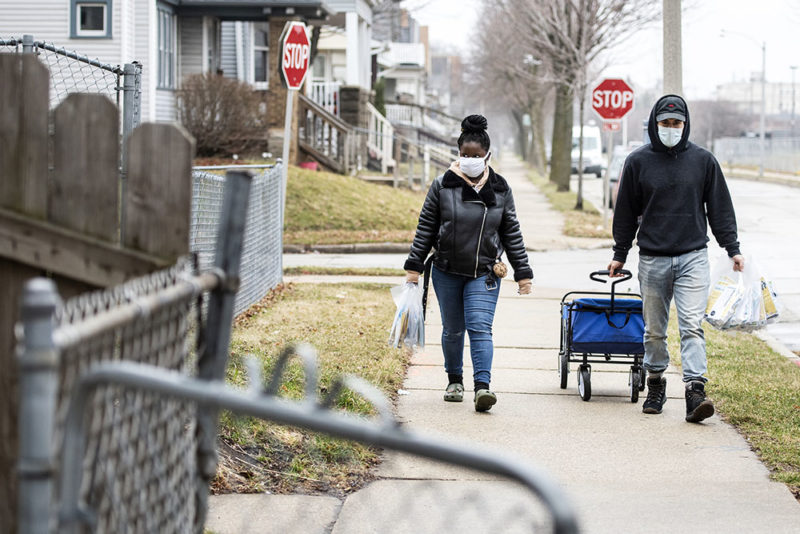‘We’re not given the option to get vaccinated’: Advocates work to narrow racial and ethnic disparities in Wisconsin
Share
Explore Our Galleries
Breaking News!
Today's news and culture by Black and other reporters in the Black and mainstream media.
Ways to Support ABHM?
By Bram Sable-Smith, Milwaukee Neighborhood News Service

Barbara felt ecstatic in January when a Wisconsin Department of Health Services letter confirmed that she and her parents were eligible for COVID-19 vaccinations.
The 28-year-old education student lives with her parents in Milwaukee. All three share caretaking duties for Barbara’s young child, who is on the autism spectrum. That unpaid work qualifies them as frontline health care personnel in Wisconsin’s vaccine rollout.
WPR and Wisconsin Watch are withholding Barbara’s last name to avoid repercussions for her parents, who are living in the country without legal authorization. The family arrived in Wisconsin from Mexico about two decades ago. Barbara is currently protected from deportation under the federal Deferred Action for Childhood Arrivals (DACA) policy, which grants some rights to eligible immigrants who came to the United States as children.
Barbara shouldered more caretaking duties during the pandemic because her parents work outside of the home, and they feared exposing the child to the coronavirus. Vaccinations would make everyone’s life a little easier. Booking three appointments at a Milwaukee Walgreens went smoothly.
But the pharmacy staff turned away her parents because their IDs were expired, she said. Barbara said she presented two current, state-issued IDs but was asked for additional proof of residency. The pharmacy gave her a 45-minute deadline to return after fetching it from home, she said.
The family left and didn’t come back. It is just one example of what some members of racial and ethnic groups in Wisconsin say are barriers to getting vaccinated among people hardest hit by the pandemic.
Shots at last
The family eventually received shots through the Milwaukee Health Department, where a family member works. But not until a month later.
“A lot of us want to get vaccinated. But we’re not given the option to get vaccinated,” she said. It’s very challenging, especially for the undocumented community.”
Walgreens would not comment on Barbara’s experience unless she signed a medical privacy waiver, a corporate spokesperson said in an emailed statement. The pharmacy asks for identification at the appointment and in the store to match the person receiving the vaccine to the person who booked it online, according to the statement.
“Unless specifically required by a jurisdiction, our policy is to not turn away individuals who do not produce an ID,” the statement said. “Neither a state-issued ID nor U.S. citizenship is a requirement for a vaccine. We are reiterating this policy with our 40,000+ pharmacy team members.”
Vaccinations hard to find for some
Public health leaders have called Wisconsin a national leader for quickly and widely delivering shots to residents. But access remains far from even among Wisconsinites. The state’s racial, ethnic and other minority groups face major barriers to inoculation — just as those groups suffer a disproportionate share of COVID-19 infections, hospitalizations and deaths. A March study of 48 states ranked Wisconsin 32 in delivering shots to highly vulnerable communities.
Interviews with Barbara and others illustrate how barriers are fueling disparities in the state’s vaccination rollout…
Read the full article here.
More Breaking News here.










Comments Are Welcome
Note: We moderate submissions in order to create a space for meaningful dialogue, a space where museum visitors – adults and youth –– can exchange informed, thoughtful, and relevant comments that add value to our exhibits.
Racial slurs, personal attacks, obscenity, profanity, and SHOUTING do not meet the above standard. Such comments are posted in the exhibit Hateful Speech. Commercial promotions, impersonations, and incoherent comments likewise fail to meet our goals, so will not be posted. Submissions longer than 120 words will be shortened.
See our full Comments Policy here.